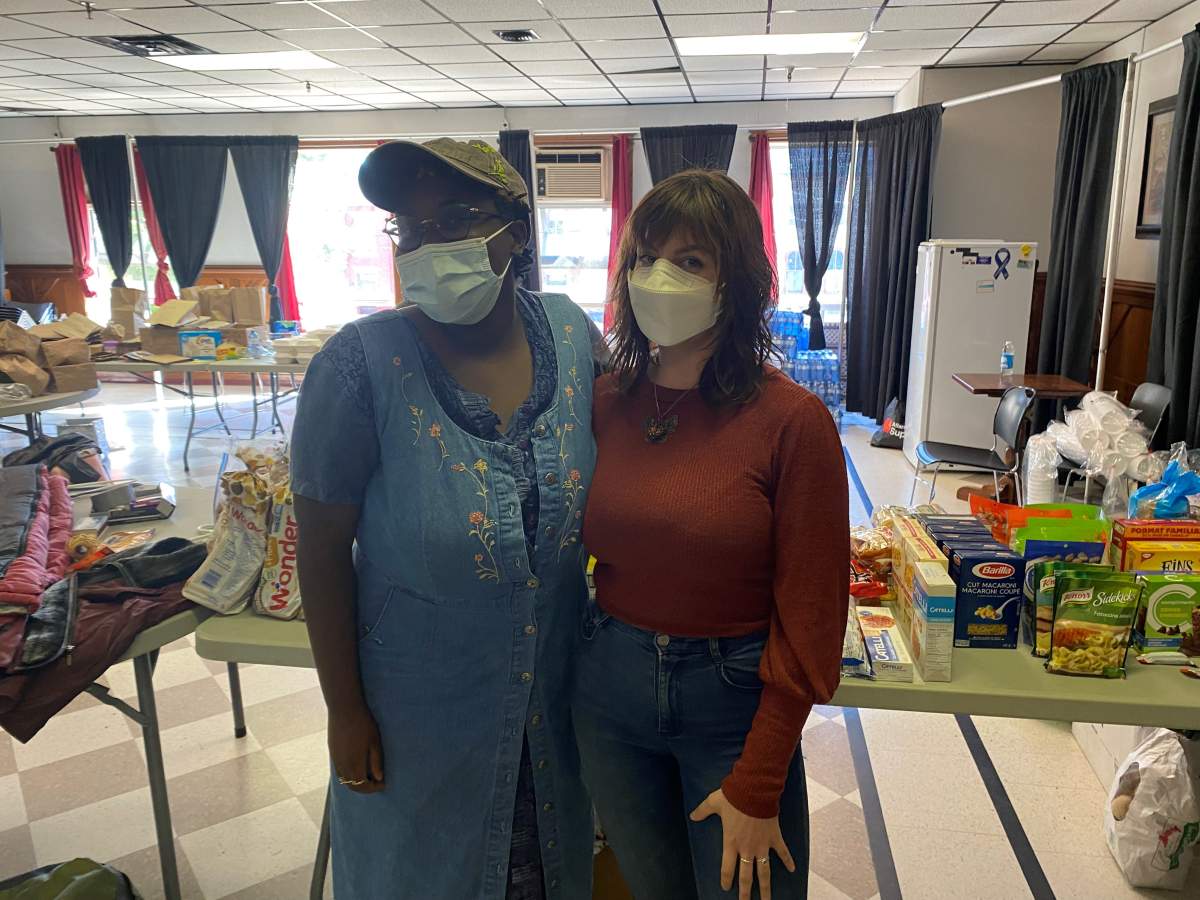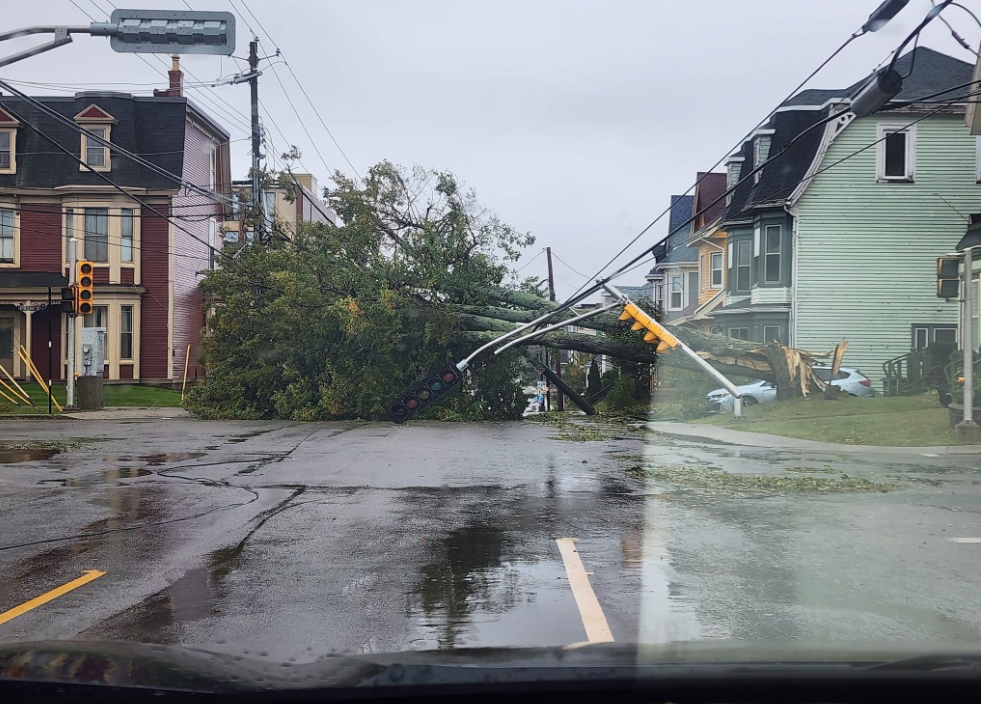Sharlene MacLean woke up to a cold, dark house Monday, and she still has no idea when her Charlottetown home will see power restored 10 days after Fiona slammed into Prince Edward Island.

The temperatures dipped below freezing Monday morning in P.E.I., which made the ongoing power outage leave her feeling “more fragile,” she said.
“Every day you think, ‘This will be the last one. The lights come on any minute,’ and every morning you wake up,” she said, pointing to the dark windows of her home.
“Meanwhile the situation gets worse because we’re out of candles, you run out of kerosene.… For some of us with no power, the situation is growing steadily worse.”
MacLean is one of 16,500 customers still without power more than a week after Fiona hit the Island as a post-tropical storm. This represents about 38,000 residents, or just under a quarter of P.E.I.’s population.
On Monday, the province’s power utility, Maritime Electric, said it could be several more days before most of the province has electricity restored. Spokesperson Kim Griffin said about 98 per cent of customers are expected to have power by Sunday.
- Tumbler Ridge B.C. mass shooting: What we know about the victims
- Trump slams Canada as U.S. House passes symbolic vote to end tariffs
- ‘We now have to figure out how to live life without her’: Mother of Tumbler Ridge shooting victim speaks
- Mental health support after Tumbler Ridge shooting ‘essential,’ experts say
But MacLean is among many in P.E.I. questioning the extended length of time it is taking to restore Islanders’ power.
After well over a week without it, most residents have been forced to trash the contents of their fridges and freezers and are now finding it challenging to keep uncooked food cold or to cook food without outdoor camping stoves or barbecues. Many of those living in rural areas with private wells also don’t have running water without power.
MacLean says she understands the damage from Fiona is extensive — just across the street from her home, two large trees can be seen still lying against a house where they crash-landed sometime during the storm on Sept. 24.
Still, trying to survive without heat, food and electricity for over a week has been hard to endure, she said.
“I know they’re working hard and flat out, God bless them,” she said.
“But I find it hard to believe in the 21st century in Canada, in this day and age, that there’s 200 (electric) teams working right now on the Island and there’s places where vulnerable people are who still have no power. It doesn’t seem right.”
MacLean’s daughter, Tara MacLean, agrees.
“The fact that we’re still in this crisis is just unbelievable to me,” she said.

The younger MacLean finally saw her power restored on Sunday after nine days without power. She didn’t immediately realize it was back up and running and learned of the good news when a neighbour came to her door to tell her.
“She came over and she knocked on the door and started yelling, ‘The power is on, the power!’ And we fell into each other’s arms, sobbing.”

Get daily National news
But MacLean remains concerned for the tens of thousands still without electricity, especially a number of low-income seniors living in provincially owned housing who were left in the dark for days with no emergency lighting and no one checking in on them days after the storm.
Several of them who spoke with Global News last week deplored the lack of assistance for those with disabilities and health issues.
“I honestly can’t believe that when elders are cold and hungry and alone and in the dark, that it isn’t kind of getting to be a bit of a humanitarian crisis,” MacLean said.
“We have basic rights to safe shelter and food and water. And I know that they’re working hard, but … I don’t think our government (members) are bad people. I just don’t think we were prepared.”
Wanda Arnold, a 70-year-old resident of Huntingdon Court seniors complex in Charlottetown, said Monday she and other residents have been given blankets, but at night they’re shivering in the dark without heat or power.
A grassroots group of volunteers has since mobilized to help these seniors and many other vulnerable people in the province who have not yet received any assistance from the government or other aid agencies.

A downtown community centre has become a busy hive of activity, with these volunteers gathering donations of food, clothing, blankets and gift cards and distributing them widely to residents — some of whom haven’t had a hot meal or a shower in the last 10 days, said volunteer Nouhad Mourad.
“Some people don’t even have roofs over their head.… A lot of people are being displaced by this, either temporarily or potentially permanently. So there’s so much need,” she said.
“The main thing that people need is direct access to funds, obviously, because all of this can be alleviated with support like that. But also people need things like hot meals, they need people checking on them, they need to make sure that people know that there’s people caring about them.”
But the volunteers say they believe the emergency response so far from provincial government agencies has been sorely lacking, pointing specifically to the seniors left without assistance in provincially owned seniors’ homes.
“These are provincial government housing (buildings), these are government-run institutions,” said Chanel Briggs.
“Prior to the hurricane even coming, why wasn’t that something that was already a concern? Because you have elderly populations now going days without medicine that keeps them alive. And it’s just devastating to see.”
“Where is the government response?” Mourad added. “It’s like they’ve taken the weekend off.”
Griffin explained that damage to power poles in the areas where some of these seniors’ complexes are located was extensive, which is why it is taking longer to get power back online for them.
Premier Dennis King pointed to a number of resources that have been deployed, including a team of 100 ground search and rescue workers who have been proactively checking in on some Islanders.
But he acknowledged that some people are “probably falling through the cracks.”
“We’re just on a person-by-person basis, or a household-by-household basis, trying to reach out to them and let them know that help is here,” he said during a briefing Monday.
But questions remain among many locals about not only the length of time it’s taken for power to be restored, but also why telecommunications companies have not been part of the province’s regular briefings to answer questions about cellular and mobile data disruptions and outages across the province since the storm.
That’s why Charlottetown resident Andrew Chisholm says he believes a public inquiry will be necessary to get to the bottom of how the response to this storm has been handled.
Only a public inquiry could compel full transparency from some of the private corporations involved in the storm response, including the telecom companies and the power utility, which is owned by Fortis Inc., said Chisholm, who went nine days before his power was restored Sunday.
“We deserve answers and public inquiries are conducted in the public and they’re transparent because a (public inquiry) commissioner has powers to make sure the people that should be there are there, like telecommunications companies, Maritime Electric, even the Red Cross,” Chisholm said.
“The only way we’re going to prevent something like this from happening again is to know what happened this time.”
King said he “would never say no” to such an inquiry, but said a comprehensive review at the very least will be conducted after the immediate emergency is over.
“Right now we’re focused on trying to get the lights back on and trying to get money into the hands of people as fast as we can.”
— with a file from The Canadian Press.











Comments
Want to discuss? Please read our Commenting Policy first.